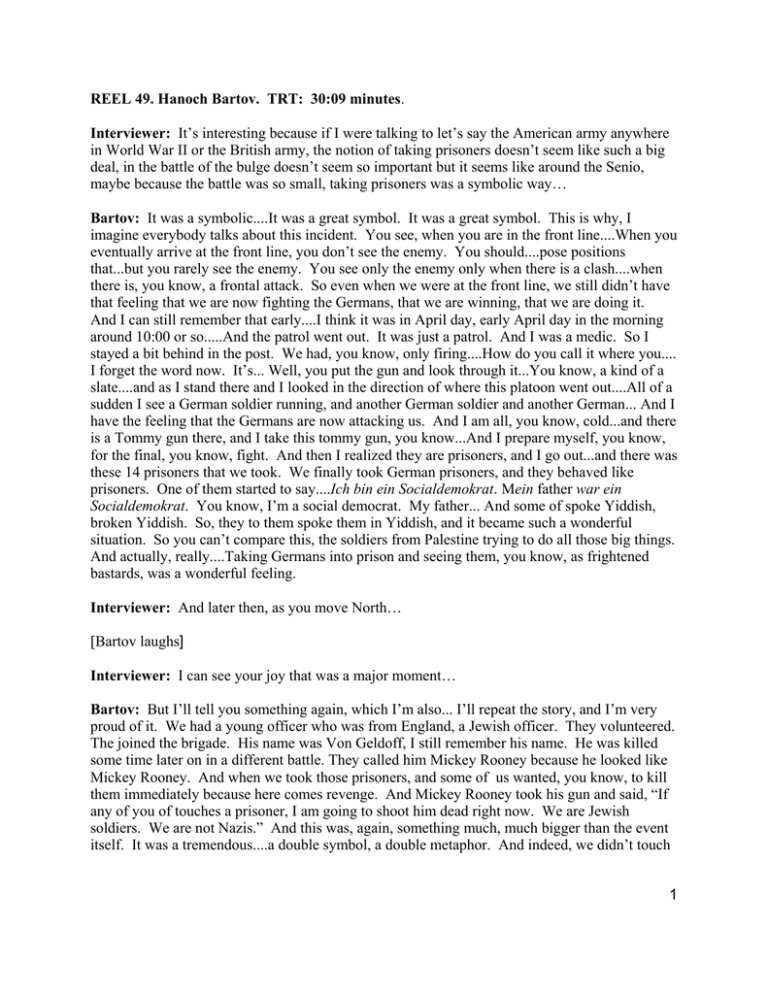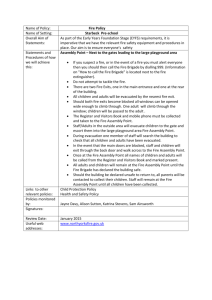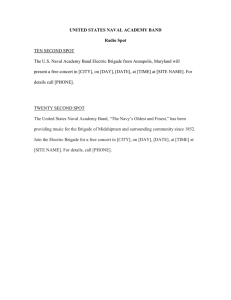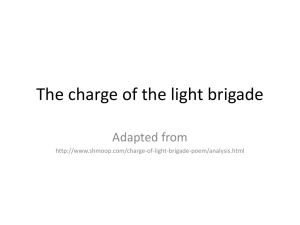in World War II or the British army, the notion... deal, in the battle of the bulge doesn’t seem so... REEL 49. Hanoch Bartov. TRT: 30:09 minutes
advertisement

REEL 49. Hanoch Bartov. TRT: 30:09 minutes. Interviewer: It’s interesting because if I were talking to let’s say the American army anywhere in World War II or the British army, the notion of taking prisoners doesn’t seem like such a big deal, in the battle of the bulge doesn’t seem so important but it seems like around the Senio, maybe because the battle was so small, taking prisoners was a symbolic way… Bartov: It was a symbolic....It was a great symbol. It was a great symbol. This is why, I imagine everybody talks about this incident. You see, when you are in the front line....When you eventually arrive at the front line, you don’t see the enemy. You should....pose positions that...but you rarely see the enemy. You see only the enemy only when there is a clash....when there is, you know, a frontal attack. So even when we were at the front line, we still didn’t have that feeling that we are now fighting the Germans, that we are winning, that we are doing it. And I can still remember that early....I think it was in April day, early April day in the morning around 10:00 or so.....And the patrol went out. It was just a patrol. And I was a medic. So I stayed a bit behind in the post. We had, you know, only firing....How do you call it where you.... I forget the word now. It’s... Well, you put the gun and look through it...You know, a kind of a slate....and as I stand there and I looked in the direction of where this platoon went out....All of a sudden I see a German soldier running, and another German soldier and another German... And I have the feeling that the Germans are now attacking us. And I am all, you know, cold...and there is a Tommy gun there, and I take this tommy gun, you know...And I prepare myself, you know, for the final, you know, fight. And then I realized they are prisoners, and I go out...and there was these 14 prisoners that we took. We finally took German prisoners, and they behaved like prisoners. One of them started to say....Ich bin ein Socialdemokrat. Mein father war ein Socialdemokrat. You know, I’m a social democrat. My father... And some of spoke Yiddish, broken Yiddish. So, they to them spoke them in Yiddish, and it became such a wonderful situation. So you can’t compare this, the soldiers from Palestine trying to do all those big things. And actually, really....Taking Germans into prison and seeing them, you know, as frightened bastards, was a wonderful feeling. Interviewer: And later then, as you move North… [Bartov laughs] Interviewer: I can see your joy that was a major moment… Bartov: But I’ll tell you something again, which I’m also... I’ll repeat the story, and I’m very proud of it. We had a young officer who was from England, a Jewish officer. They volunteered. The joined the brigade. His name was Von Geldoff, I still remember his name. He was killed some time later on in a different battle. They called him Mickey Rooney because he looked like Mickey Rooney. And when we took those prisoners, and some of us wanted, you know, to kill them immediately because here comes revenge. And Mickey Rooney took his gun and said, “If any of you of touches a prisoner, I am going to shoot him dead right now. We are Jewish soldiers. We are not Nazis.” And this was, again, something much, much bigger than the event itself. It was a tremendous....a double symbol, a double metaphor. And indeed, we didn’t touch 1 them, and I remember...We carried them to Ayeshalon. That’s what it was called. And there, they were taken by our M.P.’s. Interviewer: When you then saw the prisoners, saw the German prisoners of war coming down and you said you threw stones at them and I read in your book. Bartov: Yes. Yes. Interviewer: Whether or not you did revenge yourself or believed in it, the passion that all you guys brought to battle and the frustration that your battle was short and your knowledge that just over the next hill in Poland and Czechoslovakia and Germany, Austria were family members or no family members. Bartov: Right. Interviewer: What was the gut sense of people to do with all these feelings of I assume, rage and madness combined. Bartov: There was rage and frustration. And again, you see, I must also come back to the fact that we were young men. We were young men, and we were alive. And you can’t just, you know, all day long have rage and this. We were living our lives. What we needed was....What everybody needs in a situation like this is a purpose, is a clear purpose. The minute all those feelings of both importance and rage and frustration were directed into this purpose of the Jews were coming....Things changed all of a sudden...and we were happy to do it. They were small things, but see.....You were told to give up some of our blankets, some of the bread. We took the chocolate, everything. And then everyone felt so wonderful, you know, that they could do those little things. Or the chauffeurs, the drivers, who were driving 400, 500 miles, you know, in the direction of Munich and Poland and Czechoslovakia... And creating it as I said earlier, that freedom train. But beyond that, we were also young men who loved to drink, have fun, and go to Venice, and have girls, and....We were human beings. Interviewer: And yet you must have gotten very old very quickly when you finally got to a place like Klagenfort. Describe again… Bartov: Well, to me..... Again, it’s a personal thing. I speak only as one individual. As I told you earlier about Klagenfort after 50 years, you see. When I, Hanoch, a young boy of 18 with a few friends....some of them were new immigrants. Some of them had Israeli families there, and we come to a German. It was called Austria, but to me there wasn’t and isn’t any difference. They were the same Nazis. And they willingly cooperated. And we come to a railway station. All the insignia....The Nazi insignia are still there. The manager of the station…it’s torn, but you can still see, you know....It’s still the shade, the faded part, you know, you can see. And we now, again.... We now are going to revenge. We are now going to do the big thing. But what do you do? What do you do? You can throw him out of his office. We did it. We threw him out of his office, and we took over the place. We put our things...We ordered him around. Then we went out to town to see...What could we do? And we could do nothing. What could we do? We couldn’t, you know, walk the streets and shoot. What we could do is to look for Jews. This is the 2 only thing we could really do, and that woman who I mentioned earlier, this young nurse....who for some sixth sense. You know, the Jewish sense....told us that she must be a Jewish girl. The way she stand, the way she looks, the way she stopped. Interviewer: Start the story over because I won’t be able to use it the way you just started it, describe it like it happened. You were in Klagenfort… Bartov: We were walking, you know, along a main road, along a main street and talking among ourselves. What can we do? Where can we try and find Jews? And we arrived at a kind of a huge square, with cobble stone... You know, paved with cobblestone, and I still can see a gate there of some medieval.... probably something. And there at the edge of this square stood a young woman. And I can still see her, you know, dressed in like Marlene Dietrich style. You know, a beret, a raincoat. And she could have been anybody, but we the sense that she was Jewish. And we went over to her. And one...She starts to talk and she spoke German, and somebody started to talk to her in German and told her...You see, we are from the Jewish Brigade. We are from Palestine. Who are you? And then she said, whisperingly, that she is a Jewish girl with Aryan papers, working at the hospital here. And we told her, “Why are you whispering? The war is over? It finished.” She said, “Yes. Yes. But....” she still and she was very agitated, and again.....but still frightened. And we asked her, “Do you know of any more Jews here?” And she said, “Well, I know of a group of Hungarian Jews. I think they are tailors. And if you walk back along the street you came from.” So, we told her, “Why don’t you come with us?” So, she said, “I’ll come with you, but I...... Interviewer: Go back. I am sorry. I hate to do this. The airplane…[cut]. Bartov: And we are asking her are there any more Jews here, and she says, “Well, there is a group of Hungarian.... I think that they are tailors. And they stay in a house right on the street that you came from. And we asked her, “Could you show us?” And she, reluctantly.....She says, “OK, I’ll walk with you.” And she walked with us, and there is a house that... the upper part of it, I can still see it, you know, as if it were yesterday. The upper part of it was destroyed and are scaffoldings around it. And she says, “Now, you go from the side. There is an entrance to a cellar. I won’t go in with you.” We said, “What.” She said, “I won’t, thank you.” And she disappeared. She was afraid. She was still afraid a month after the war was over. She was still afraid. And we entered. And I don’t know if we remember that it was the Sabbath or no...I’m not so sure...But as we entered this center, we realized that it was the Sabbath, before sunset. And this group of Jews were sitting around a makeshift table, and they’re celebrating as they call this, the departure of the Sabbath. You know, they called the third meal. Singing and having some drink. And we enter, a group of young men from Israel. And we say, “Shabbat Shalom. We are soldiers from Palestine, Jewish soldiers.” And they look at us. They don’t know what we’re talk about. They are suspicious because we are in uniform. We are British soldiers. And they had enough with uniforms. But, after.... We repeated once and twice.... And then they suddenly realize who we are. And they have, and we have a kind of a.....Again, I must say a kind of a religious experience. that jump at us as if we really were the Messiah. And when we explain to them that we are on the border. There’s the brigade. So, they say, “Ok, we are coming.” And we said, “No, you can’t come. We are in the British army. You stay here a few more days, and we’ll see to it....They don’t let us go. And I do remember that moment that in 3 order to somehow...Somehow make them believe in us...I tear off my sleeve, the badge, you know, of the brigade, which was a yellow star with a background... a blue, white...blue background. and the men takes it as if it was, you know, a Talisman. This is the moment that I, for one, knew that I am a part of something very great. Interviewer: It sounds like that in some ways that story is really a metaphor for everything most important part of it… Bartov: The big thing is that it is a metaphor, and it’s simple fact at the same time. There is no literary, you know flowering of this. This is how it was, and this is why this metaphor has, for me, this kind of mystical, religious element in it. Nothing invented. Interviewer: That’s a tiny little accidental moment, a Jewish, a scared Jewish young woman on the street, the Sabbath, Hungarian Jews. And yet you are also playing the story out on a very large world stage, in terms of the survival of the Jewish people, the end of World War II, etc. How important, do you think was the brigade’s involvement in the Bricha, in getting people to the camps and getting people trained and getting them moved south compared to other Jews who were also active whether it was the joint or whether it was members of the Mossad or the Haganah operating independent of you. I never quite understood how much credit the brigade gets and how much credit everyone should get for this movement. Bartov: I think that when you speak about the brigade’s role... At this juncture, we speak now about the summer of ‘45. Two, sometimes the second part of ‘46. That first year. Now, that first year was crucial because all those organizations that you’ve mentioned were not there yet. The organized Jewish involvement took time to materialize. The presence of the brigade, on the other hand, was not all important. It was, to go back to what we said earlier. This was the great metaphor of hope. The brigade, as such, was the metaphor. The 1,000 trucks was the Magen David in them, with the Star of David in them. The soldiers who were masters of the situation. Their ability to provide food, clothing, shelter, transportation. This turned those...devastated, ruined survivors all of a sudden into members of this strong new force. And this was a tremendous change. If, let’s say... And there were many cases like this....that one of the survivors. It doesn’t just meet the brigade. He meets his brother. He meets his cousin. He meets his uncle. And all of a sudden, he is again part of a different Jewish situation, of a future... In this sense, the brigade kindled the imagination of survivors, and they came running towards it from all over. Later on.. Later on, of course, it became of lesser and lesser significance as the other things developed, but at the initial stage.. It is my strong view that had not the brigade been there....and the other 10,000 soldiers from Palestine in Palestinian units all over Italy.... Modern Jewish history would have looked different. The post-war history, I mean. And.... I don’t know if even if the state of Israel would have been founded because it was only the concerted pressure of both those immigrants who now realize there is Palestine to go. There is this young Israeli, this handsome young Israelis will protect us. They want us. And the effort in Palestine to get independence and made it. So when you speak about the brigade and the 10,000 other volunteers from Palestine in Italy.... It was not just important. It was crucial. Interviewer: What you said about Klagenfort and this one particular story was clearly replicated all over Europe by individual brigade members… 4 Bartov: Endless stories. Endless, endless stories. I could tell you stories from my own experience.....but I could tell you endless stories. You see....When you see Israel today, 51 years later..... We had a friend....A retired Supreme Court Judge, Judge Baskey. He’s a friend, a good friend. Now, he was there, one of the survivors. They are generous.... There’s another…The man who is now president of the Supreme Court, Barak. He’s a child survivor from the Kovno ghetto. So, it’s not just, you know, an anecdote. It’s an existential situation. Interviewer: But how did you make it all happen? You were in the British army; you were stationed in Turkey for quite a while. I assume you had to show up in the morning and salute and go to bed in your bed at night. How did each of you…What was your motivation…? Bartov: Well, I gave you... I think I’ll give you an example. First of all, very soon... Not me. I was a very small peg, you know, and I don’t want to take credit for things I had no part in. But we cooperated in a small way. But the people who were... You know, the real leaders...Very soon the whole machine was geared to cheat everybody in order to save Jews. By hook or by crook. For instance, just to give you one instance when I was involved... We were guarding a German electricity depot in Ponteba. It’s the same area on the Italian frontier. They dug into the Alps, you know. A huge electrical depot. Now, we were there for three weeks or so. After three weeks, there was an inspection by some British high officials. There was nothing left there. It was all stolen, sold, and used to organize the Bricha, And they say, “How could it be?” We said, “We don’t know. That’s what we found. There was nothing here.” Now, in order for cars to drive, there was a whole system of forged movement orders, and it was, in fact, an agreed code. It was called TTG. Now, TTG, was in fact the initials of a dirty word in both Arabic and Yiddish. In meant nothing. I don’t want to repeat it, but those are know know. And all documents were signed TTG, destination TTG. All gas depots were used, you know, liberally for this. It was a huge organization, done for the noblest purpose imaginable, and I think that we are all very proud to have been part of this illegal operation. Interviewer: Who told you to do it or did it come from your hearts? Bartov: It’s something that, really, I cannot pinpoint. I remember things, you see. For instance, in our battalion... You know, there was the quarter master. Yes. So, the quarter master decided that today, instead of getting so much bread, we get half. Instead of getting chocolate, we don’t get chocolate at all. And so on and so forth. And everybody understood, and everybody, you know, was just very willing. So it was passive role, but it was a passive role which, I think, made every one of us that he’s a part of it. Interviewer: Was it something from a Ben Gurion or a Sharett… Bartov: Well, I think that they came into the picture rather late, later. At the beginning, it was a spontaneous thing started with the troops. They started it, and all the other stories are late inventions. Interviewer: Why do you think the brigade has received so little note in history? 5 Bartov: I think that....I think that there are a number of reasons that, you know, secondaries.... A major, I think, explanation. I think the main explanation is that the brigade was not an organization that had a ... a strong self-image. It was organized for a purpose, for the war. And when it was disbanded in ‘46... It was disbanded in ‘46. And people came back. Everyone went his own way. There was not this organization, you know, that was conscious, of its place in history and started to write the history. And what’s more, you have to remember that very soon after our return from the war, there was another war. You have to remember... Let’s say I was....discharged in July ‘46. In the first of December, ‘47, I was already again a soldier, again, in the Israeli army. And many of the brigade members were killed and so on. And there was another story, a bigger story. A thing that caught the imagination, and people had no time to think about what was just two, three years earlier. And by the time the brigade started to think about its history, it was a bit too late. This is my explanation. Interviewer: So history, really, as you say swamped you with…dumped the boat with a bigger… Bartov: Right. With a much bigger story. Interviewer: But how do you...What was the importance of the brigade to the brigade members to the fighting and winning of that war? Bartov: Well, I think it was for... Really, again, of great importance by the very fact that here came not only the brigade....British soldiers... We came back from the British army. Here, there were thousands of young men, who had been trained in a real army to use real modern equipment. To use guns, to use machines, to use airplanes, to use mortars. Everything. Many of them were junior commanders and had experience in command. Some of them were captains, majors, and a few of them were even more.... While the Israeli Haganah forces had no experience at all in combat of larger formations. And already, ‘48, you know, it’s a known story. In ‘48, there was already the first... How shall I say? Confrontation between the Palmach and the brigade... Well, Ben-Gurion took the side of the brigade. He needed the experience. This is why Shlomo Shamir and became the commander of the seventh brigade, and Haim Laskov became commander, and Remez became the commander of the airforce. And so on. And Zarro became... My battalion commander.... All those people who came from the British army had brought us larger know-how and some experience in real warfare. So we played, I think, a real important role...Not only in the war, but in the organization of the Israeli army. Interviewer: Maybe that’s… [END OF 49] 6





